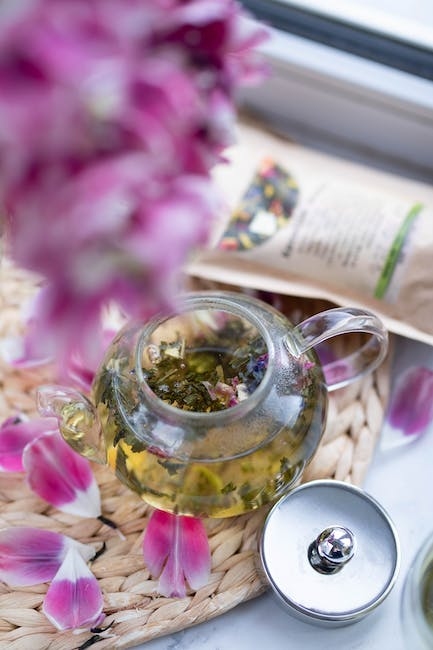Introduction to Herbal Tea and Green Tea
Herbal tea and green tea are both widely appreciated for their numerous health benefits and delicious flavors. While herbal tea is made from the infusion or decoction of herbs, spices, or other plant materials, green tea is made from the leaves of the Camellia sinensis plant. Both types of tea have been consumed for centuries and are enjoyed by tea lovers all over the world.
Herbal teas are often celebrated for their calming and soothing properties. They can help with digestion, promote relaxation, and offer relief from common ailments such as headaches and anxiety. On the other hand, green tea is known for its high levels of antioxidants and beneficial compounds such as catechins, which have been linked to improved heart health, weight loss, and a strengthened immune system.
While herbal teas come in a wide variety of flavors and aromas, green tea has a distinct grassy and slightly bitter taste. Some popular herbal tea options include chamomile, peppermint, ginger, and lavender, each with its own unique combination of flavors and potential health benefits. Green tea, on the other hand, comes in different varieties such as matcha, sencha, and jasmine, each with its own distinctive taste and processing method.
Whether you prefer the soothing properties of herbal tea or the invigorating effects of green tea, there is a wide range of options to choose from. Both types of tea offer a delightful way to hydrate and enjoy the natural goodness of plants. So, let’s explore the different types of herbal teas and green teas, discover their health benefits, and learn how to prepare them for a satisfying tea experience.
Health Benefits of Herbal Tea and Green Tea
Both herbal tea and green tea are known for their numerous health benefits. Let’s take a closer look at some of the key benefits associated with each type of tea:
Herbal Tea:
- Calming and Relaxing: Many herbal teas, such as chamomile and lavender, have natural calming properties that can help reduce stress, promote relaxation, and improve sleep quality.
- Improved Digestion: Certain herbal teas, like peppermint and ginger, are widely used to aid digestion and alleviate common digestive issues such as bloating, indigestion, and nausea.
- Boosted Immune System: Some herbal teas, such as echinacea and elderberry, are believed to have immune-boosting properties that can help strengthen your body’s defenses against common illnesses.
- Antioxidant Benefits: Certain herbal teas, including hibiscus and rooibos, are rich in antioxidants that can help combat free radicals and potentially reduce the risk of chronic diseases.
Green Tea:
- Weight Management: Green tea contains catechins and caffeine, which have been linked to increased metabolism and fat oxidation, thus potentially aiding in weight management.
- Heart Health: Regular consumption of green tea has been associated with a reduced risk of heart disease, as it may help lower LDL (“bad”) cholesterol and triglyceride levels.
- Enhanced Brain Function: The combination of caffeine and other bioactive compounds in green tea can have a positive effect on brain function, improving focus, alertness, and overall cognitive performance.
- Increased Energy: Green tea contains a moderate amount of caffeine, which can provide a natural boost in energy and help improve physical performance.
It’s important to note that while herbal tea and green tea offer potential health benefits, they are not intended to replace medical advice or treatments. If you have specific health concerns, it’s best to consult with a healthcare professional.
Now that we’ve discussed the health benefits of herbal tea and green tea, let’s explore the different types of herbal teas and green teas that you can enjoy.
Different Types of Herbal Teas and Green Teas
Herbal teas and green teas come in a wide range of varieties, each offering its own unique flavors and potential health benefits. Let’s explore some of the popular options:
Herbal Teas:
- Chamomile Tea: Known for its calming properties, chamomile tea is made from dried chamomile flowers and has a mild, floral taste. It is often enjoyed before bedtime to promote relaxation and improve sleep quality.
- Peppermint Tea: Peppermint tea is known for its refreshing taste and soothing effect on the digestive system. It is commonly used to alleviate bloating, indigestion, and other digestive discomforts.
- Ginger Tea: Made from the root of the ginger plant, ginger tea has a spicy and invigorating taste. It is often used to aid digestion, reduce nausea, and relieve cold and flu symptoms.
- Lavender Tea: With its delicate floral aroma, lavender tea is known for its calming and soothing properties. It can help promote relaxation, reduce stress, and improve sleep quality.
Green Teas:
- Matcha Tea: Matcha is a finely ground powder made from shade-grown green tea leaves. It is known for its vibrant green color and earthy flavor. Matcha tea is rich in antioxidants and provides a sustained release of energy due to its unique preparation method.
- Sencha Tea: Sencha tea is the most commonly consumed type of green tea in Japan. It has a grassy flavor and is high in antioxidants. Sencha tea is usually prepared by infusing the whole tea leaves in hot water.
- Jasmine Tea: Jasmine tea is made by scenting green tea leaves with jasmine flowers. It has a delicate, floral aroma and a subtly sweet taste. Jasmine tea is often enjoyed for its calming effect and soothing qualities.

These are just a few examples of the many herbal teas and green teas available. There are countless other varieties to explore, each offering its own unique flavors, aromas, and potential health benefits. Whether you prefer the soothing properties of chamomile or the vibrant taste of matcha, there is a tea out there to suit every preference.
Now that we know the different types of herbal teas and green teas, let’s move on to the next step – learning how to properly prepare these teas for the perfect cup.
How to Prepare Herbal Tea and Green Tea
Preparing herbal tea and green tea requires a few simple steps to ensure that you extract the flavors and potential health benefits properly. Here’s a guide to help you prepare the perfect cup:
Herbal Tea:
- Boil fresh, filtered water. The quality of water used can impact the overall taste of the herbal tea.
- Place 1-2 teaspoons of dried herbs or herbal tea bags in a cup or teapot.
- Pour the hot water over the herbs and allow them to steep for about 5-10 minutes, or as directed on the packaging.
- Use a strainer or remove the tea bags to separate the infused herbal tea from the herbs.
- Sweeten if desired with honey, maple syrup, or your preferred sweetener. Some herbal teas taste great on their own and don’t require additional sweeteners.
- Enjoy your freshly brewed herbal tea while it’s still warm.
Green Tea:
- Boil fresh, filtered water. Allow the water to cool slightly, to around 80-85°C (175-185°F). This will prevent the green tea from becoming bitter.
- Place 1-2 teaspoons of loose green tea leaves or a green tea bag into a cup or teapot.
- Pour the hot water over the tea leaves and let them steep for 2-3 minutes. Avoid steeping for too long, as it can lead to a bitter taste.
- Remove the tea leaves or tea bag from the cup or teapot.
- You can enjoy green tea as it is or add a squeeze of lemon or a drizzle of honey for added flavor.
- Savor your green tea while it’s still warm to fully experience its flavors and potential health benefits.
Remember, the steeping times mentioned above may vary depending on the specific type and brand of herbal tea or green tea you are using. Always refer to the instructions provided on the packaging for the best results.
With these simple steps, you can enjoy a delightful cup of herbal tea or green tea in the comfort of your own home. Experiment with different steeping times and flavor combinations to find your perfect cup.
Now that you’ve learned how to prepare herbal tea and green tea, let’s wrap things up with some final thoughts on the benefits of these amazing teas.
Conclusion and Final Thoughts on Herbal Tea and Green Tea
Herbal tea and green tea offer a wide range of flavors, aromas, and potential health benefits. Whether you choose to indulge in the soothing properties of herbal tea or enjoy the invigorating effects of green tea, both options provide a refreshing and delicious way to incorporate the goodness of plants into your daily routine.
Herbal teas, such as chamomile, peppermint, ginger, and lavender, can promote relaxation, aid digestion, boost the immune system, and provide antioxidant benefits. With their calming and soothing properties, herbal teas offer a natural remedy to common ailments and a wonderful way to unwind after a long day.
On the other hand, green tea, including varieties like matcha, sencha and jasmine, is known for its high levels of antioxidants, weight management benefits, support for heart health, and enhanced brain function. Green tea also offers a moderate amount of caffeine, providing a gentle energy boost without the jitters often associated with coffee.
When preparing herbal tea and green tea, it’s important to use fresh, filtered water and follow the recommended steeping times to extract the full flavors and potential health benefits. Whether enjoyed hot or iced, these teas offer a satisfying and rejuvenating experience.
Remember, while herbal tea and green tea provide potential health benefits, they should not replace professional advice or medical treatments. If you have any specific health concerns or conditions, it’s always best to consult with your healthcare provider.
In conclusion, herbal tea and green tea are both excellent choices for tea lovers seeking a delightful beverage that not only tantalizes the taste buds but also supports overall well-being. Whether you’re looking for a moment of relaxation or a boost of energy, herbal tea and green tea offer something for everyone. So why not explore the diverse world of herbal tea and green tea and discover the perfect cup for you?
Remember to drink tea in moderation and savor every sip!


Leave a Reply